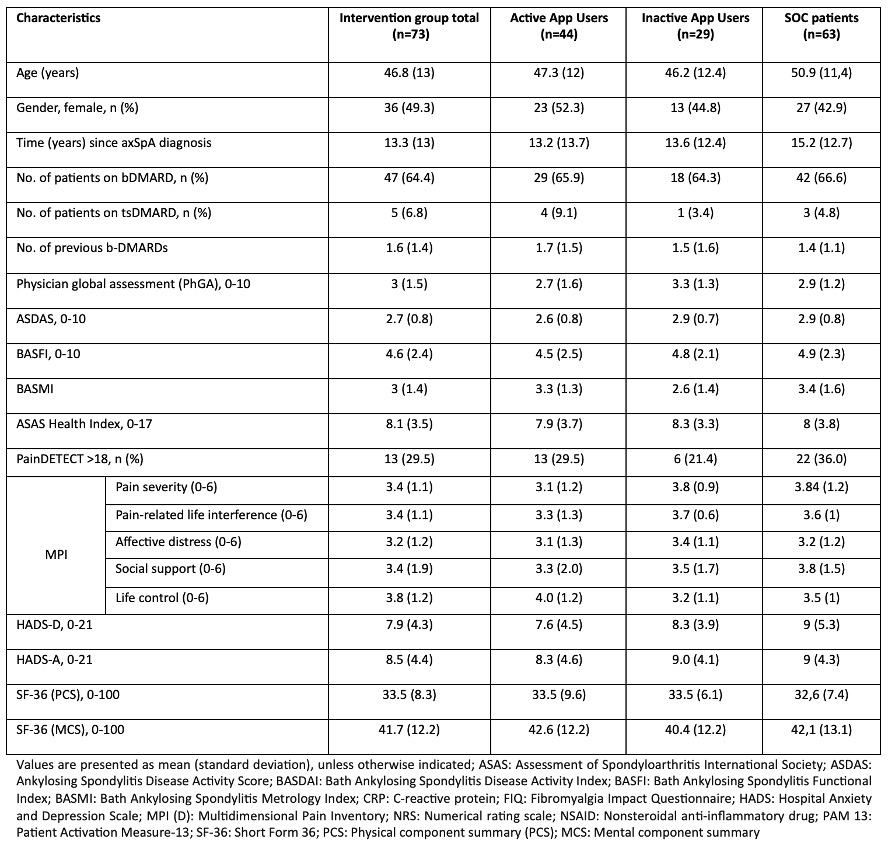Session Information
Date: Monday, October 27, 2025
Title: (1434–1466) Spondyloarthritis Including Psoriatic Arthritis – Treatment Poster II
Session Type: Poster Session B
Session Time: 10:30AM-12:30PM
Background/Purpose: Axial spondyloarthritis (axSpA) is often associated with persistent pain despite effective anti-inflammatory treatment, substantially impacting patients’ quality of life. Digital health applications (DiGAs) provide an innovative approach to address multidimensional aspects of chronic pain through psychological and behavioral strategies. Our objective was to assess the impact of a DiGA utilizing the acceptance and commitment therapy (ACT) on disease outcomes, including the West Haven-Yale Multidimensional Pain Inventory (MPI), in axSpA patients experiencing chronic back pain despite stable pharmacological therapy.
Methods: This unblinded, monocentric, randomized controlled trial (1:1) compared an intervention group receiving the ACT-app with a standard of care (SOC) group. The ACT app provided behavioral therapy in seven interactive lessons. Patients were followed for 12 weeks. The primary outcome was MPI pain-related life interference; secondary outcomes included pain severity, affective distress and other patient reported outcomes (PRO). The Patient Global Impression of Change (PGIC) was used to evaluate patients’ subjective perception of overall change during the study. Acceptance of the DiGA was assessed using the Net promoter score (NRS 0-10). Linear models estimating the effect of the ACT-app on the change of MPI pain-related life interference (model 1) and affective distress (model 2), with adjustments made for their respective baseline values, were calculated.
Results: A total of 136 patients were randomized to the intervention (n=73) with ACT-app and SOC group (n=63) without ACT-app (table 1). Among intervention patients, 44 actively used ACT-app, while 29 either did not receive the app code by their health insurance company or did not use the ACT-app at all. At week 12, all lessons in the ACT-app were fully completed by 19 (43%) patients in the intervention group. Baseline characteristics, including MPI scores, were comparable between groups (table 1). Active app users showed a significant reduction in pain-related interference (p < 0.05) as well as in other outcomes (figure 1). The improvements in pain-related life interference (model1: -0.36, 95% CI: -0.73 to 0.01) and affective distress related to the disease (model 2: -0.4, 95% CI: -0.84,0.003) were greater compared to SOC patients. Overall acceptance was moderate (Net Promoter Score 5.8 (4.3)).
Conclusion: The ACT-app demonstrated a meaningful reduction in pain-related interference, supporting that the use of DIGAs might become a supplementary tool in managing pain for axSpA patients. However, a substantial number of patients experienced challenges to use the app actively.
 Table 1: Baseline characteristics stratified by group and user activity
Table 1: Baseline characteristics stratified by group and user activity
.jpg) Figure 1: Change of clinical characteristics stratified by group
Figure 1: Change of clinical characteristics stratified by group
.jpg) Figure 2: Patient Global Impression of Change (PGIC) Categories: Comparison Between Active App Users and Standard of care (SOC) Group
Figure 2: Patient Global Impression of Change (PGIC) Categories: Comparison Between Active App Users and Standard of care (SOC) Group
To cite this abstract in AMA style:
Kiefer D, Sonkaya Y, Krause D, Voglau M, Mintrop B, Redeker I, Baraliakos X, Kiltz U. Digital Behavioral Therapy Improves Outcome in Patients With Axial Spondyloarthritis And Persistent Pain: Results From a Randomized Controlled Trial [abstract]. Arthritis Rheumatol. 2025; 77 (suppl 9). https://acrabstracts.org/abstract/digital-behavioral-therapy-improves-outcome-in-patients-with-axial-spondyloarthritis-and-persistent-pain-results-from-a-randomized-controlled-trial/. Accessed .« Back to ACR Convergence 2025
ACR Meeting Abstracts - https://acrabstracts.org/abstract/digital-behavioral-therapy-improves-outcome-in-patients-with-axial-spondyloarthritis-and-persistent-pain-results-from-a-randomized-controlled-trial/
